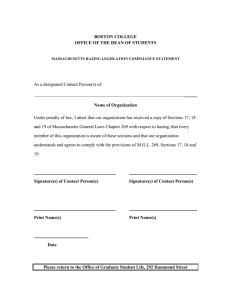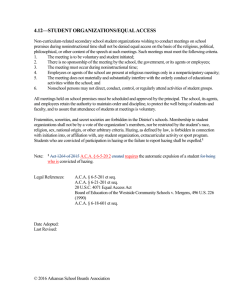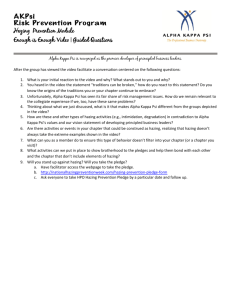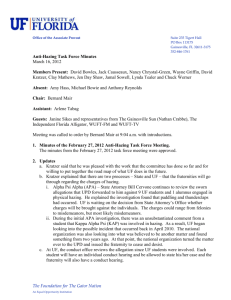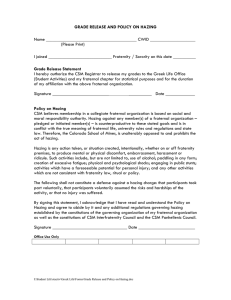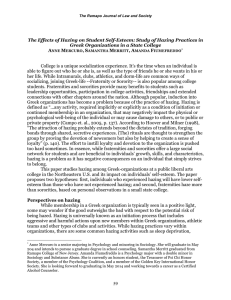Fraternity and Sorority Executive Board Liability Tori Risorto and Cherie Sherman
advertisement
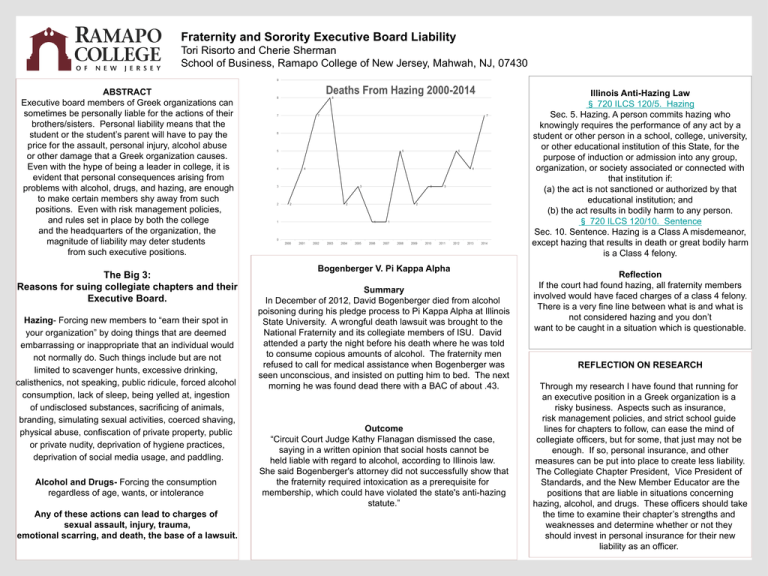
Fraternity and Sorority Executive Board Liability Tori Risorto and Cherie Sherman School of Business, Ramapo College of New Jersey, Mahwah, NJ, 07430 ABSTRACT Executive board members of Greek organizations can sometimes be personally liable for the actions of their brothers/sisters. Personal liability means that the student or the student’s parent will have to pay the price for the assault, personal injury, alcohol abuse or other damage that a Greek organization causes. Even with the hype of being a leader in college, it is evident that personal consequences arising from problems with alcohol, drugs, and hazing, are enough to make certain members shy away from such positions. Even with risk management policies, and rules set in place by both the college and the headquarters of the organization, the magnitude of liability may deter students from such executive positions. The Big 3: Reasons for suing collegiate chapters and their Executive Board. Hazing- Forcing new members to “earn their spot in your organization” by doing things that are deemed embarrassing or inappropriate that an individual would not normally do. Such things include but are not limited to scavenger hunts, excessive drinking, calisthenics, not speaking, public ridicule, forced alcohol consumption, lack of sleep, being yelled at, ingestion of undisclosed substances, sacrificing of animals, branding, simulating sexual activities, coerced shaving, physical abuse, confiscation of private property, public or private nudity, deprivation of hygiene practices, deprivation of social media usage, and paddling. Alcohol and Drugs- Forcing the consumption regardless of age, wants, or intolerance Any of these actions can lead to charges of sexual assault, injury, trauma, emotional scarring, and death, the base of a lawsuit. Illinois Anti-Hazing Law § 720 ILCS 120/5. Hazing Sec. 5. Hazing. A person commits hazing who knowingly requires the performance of any act by a student or other person in a school, college, university, or other educational institution of this State, for the purpose of induction or admission into any group, organization, or society associated or connected with that institution if: (a) the act is not sanctioned or authorized by that educational institution; and (b) the act results in bodily harm to any person. § 720 ILCS 120/10. Sentence Sec. 10. Sentence. Hazing is a Class A misdemeanor, except hazing that results in death or great bodily harm is a Class 4 felony. Bogenberger V. Pi Kappa Alpha Summary In December of 2012, David Bogenberger died from alcohol poisoning during his pledge process to Pi Kappa Alpha at Illinois State University. A wrongful death lawsuit was brought to the National Fraternity and its collegiate members of ISU. David attended a party the night before his death where he was told to consume copious amounts of alcohol. The fraternity men refused to call for medical assistance when Bogenberger was seen unconscious, and insisted on putting him to bed. The next morning he was found dead there with a BAC of about .43. Outcome “Circuit Court Judge Kathy Flanagan dismissed the case, saying in a written opinion that social hosts cannot be held liable with regard to alcohol, according to Illinois law. She said Bogenberger's attorney did not successfully show that the fraternity required intoxication as a prerequisite for membership, which could have violated the state's anti-hazing statute.” Reflection If the court had found hazing, all fraternity members involved would have faced charges of a class 4 felony. There is a very fine line between what is and what is not considered hazing and you don’t want to be caught in a situation which is questionable. REFLECTION ON RESEARCH Through my research I have found that running for an executive position in a Greek organization is a risky business. Aspects such as insurance, risk management policies, and strict school guide lines for chapters to follow, can ease the mind of collegiate officers, but for some, that just may not be enough. If so, personal insurance, and other measures can be put into place to create less liability. The Collegiate Chapter President, Vice President of Standards, and the New Member Educator are the positions that are liable in situations concerning hazing, alcohol, and drugs. These officers should take the time to examine their chapter’s strengths and weaknesses and determine whether or not they should invest in personal insurance for their new liability as an officer.
